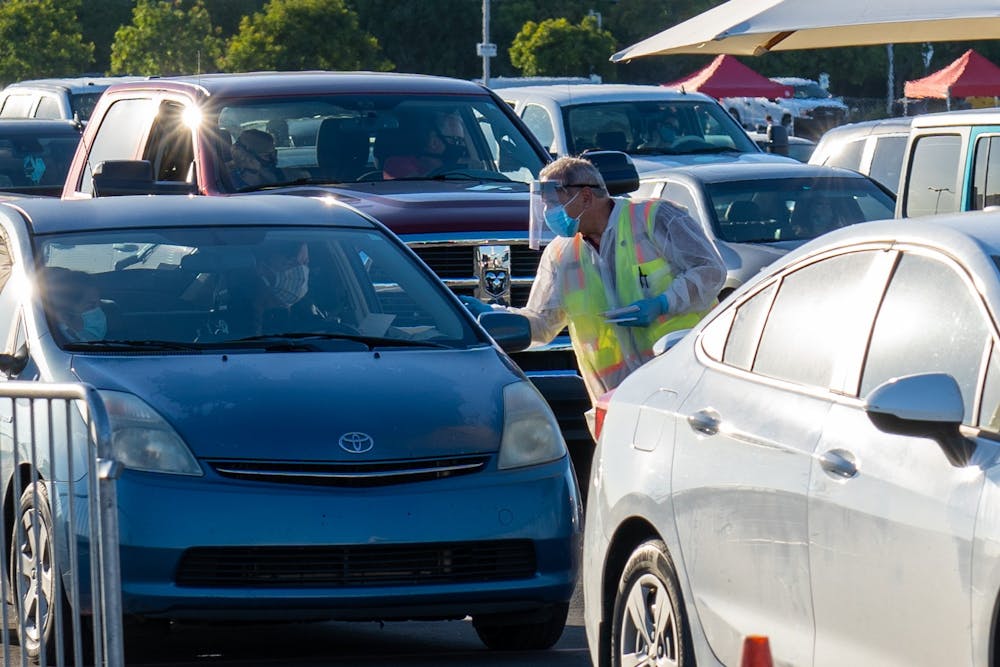Active COVID-19 cases at ASU have decreased since Monday, nearing the end of the first week of the Spring 2021 semester at a total of 858 active cases Thursday.
Cases have decreased by 42 since Monday, according to Thursday's update. The Fall 2020 semester began with 161 active cases.
Active cases among students decreased by 36 to 692 total and active cases among employees decreased by six to 166 total.
There are 600 active cases among students off campus in the metropolitan Phoenix area and 40 students are isolating on the Tempe campus. A total of 16 active student cases are on the Downtown Phoenix, West or Polytechnic campuses.
ASU has reported 5,407 cumulative cases since Aug. 1, according to the update. Since Monday’s update, cumulative cases have increased by 184 among students and increased by 43 among employees.
Meanwhile, data from the Centers for Disease Control and Prevention show Arizona has the highest rate of new COVID-19 cases per 100,000 people in the country.
Internal tracking of Arizona Department of Health Services ZIP code data where ASU campuses are located — 85281, 85004, 85306 and 85212 along with the 85282 ZIP code in Tempe — done by The State Press shows cumulative cases have increased by 7,024 since the last day of the fall semester.
There were 3,920 combined new cases reported between Tempe's 85281 and 85282 ZIP codes since Dec. 4. The 85212 ZIP code, where the Polytechnic campus is located, reported 1,894 new cases. The 85004 ZIP code, where the Downtown campus is located reported 280 new cases. The 85306 ZIP code, where the West campus is located, reported 930 new cases since Dec. 4.
Executive director of ASU’s Biodesign Institute Joshua LaBaer said at a Wednesday briefing infections in Arizona are around 10,000 cases per day, “a pretty frightening position to be in,” he said.
Community assistants, along with approximately 11,500 other community members, are now eligible to receive the COVID-19 vaccine as part of both Phase 1A and 1B of COVID-19 vaccine distribution in Arizona.
READ MORE: Community assistants now eligible for COVID-19 vaccines
The individuals eligible include "faculty, emergency workers, health workers, lab workers, police officers, those over 75, coaches and many staff and student workers in high student contact jobs," according to a University spokesperson.
“We’re vaccinating nowhere near the amount of people that it would take to have an impact on the spread of the virus in our community right now,” LaBaer said. “We have to be thinking that the virus is spreading in the way that it has been spreading for the last year.”
LaBaer said somewhere between 70 and 80% of a community should be vaccinated against the virus to prevent most spread.
“If you structure the system for prioritization, you can end up slowing things down while waiting for that first group to take advantage of their slots,” LaBaer said.
LaBaer said he predicts in the next few weeks, COVID-19 will overtake both heart disease and cancer as the leading cause of death in the state. In a typical year, around 12,000 people die of heart disease and 12,000 die of cancer. The number of coronavirus-related deaths reported in the state as of Thursday had surpassed 10,800.
When it comes to in-person learning for younger children and young adults, LaBaer said “it’s probably safer to do it virtually.”
He said schools, including colleges, are not a major source of spread because of structured environments with enforcement of rules. However, LaBaer said with the prevalence of the virus nearly everywhere, waiting until numbers decrease would be safer than meeting face-to-face.
LaBaer said a sequence from a test the Biodesign Institute believed to be the B.1.1.7 strain recently seen in an outbreak in the United Kingdom was not that particular strain.
He said the state should conduct better surveillance of virus strains as they emerge. New strains would likely not impact vaccinations but understanding as much about the virus as possible is “an important investment to make,” he said.
Reach the reporters at pjhanse1@asu.edu and kkwilso5@asu.edu and follow @piperjhansen and @kaceywilson_ on Twitter.
Like The State Press on Facebook and follow @statepress on Twitter.
Continue supporting student journalism and donate to The State Press today.

Piper Hansen is the digital editor-in-chief at The State Press, overseeing all digital content. Joining SP in Spring 2020, she has covered student government, housing and COVID-19. She has previously written about state politics for The Arizona Republic and the Arizona Capitol Times and covers social justice for Cronkite News.




